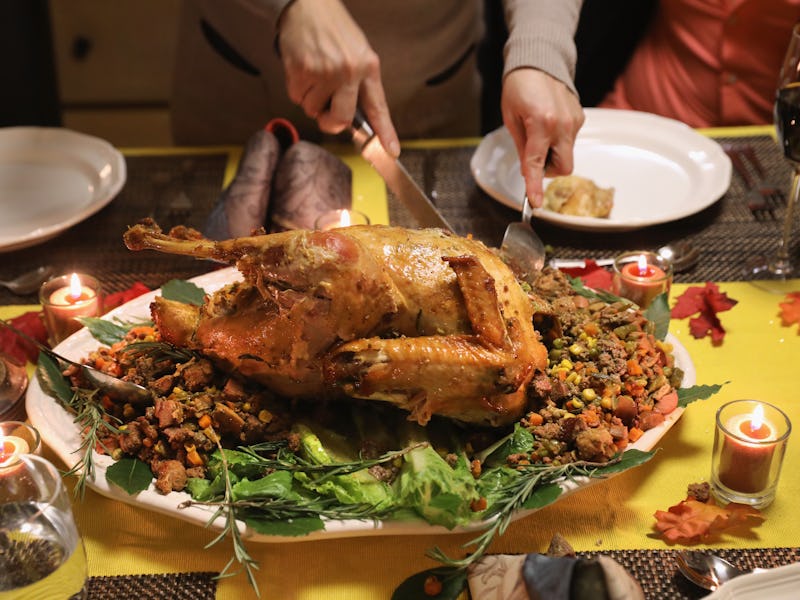How to Cook a Perfect Thanksgiving Turkey, According to Science
Because Thanksgiving dinner is not the time to wing it and end up with a burnt bird.

Each year in the weeks before Thanksgiving, it seems some TV chef appears with a newfound way to cook your turkey, swearing that it’s guaranteed to deliver the most flavorful, the most juicy, the tastiest turkey you’ve ever had.
How the hell are you supposed to decide when everyone recommends a different technique: brine it, braise it, roast it, smoke it, grill it, deep-fry it, soak it in beer, wrap it in bacon, cook it in water, something called spatchcocking (Seriously.)
Cook a Thanksgiving Turkey with Science
Before you compulsively choose a method or give up all hope cold turkey, your solution may lie in science. In its most simple sense, cooking is really just food going through a series of chemical reactions to create various tastes and consistencies, food chemist Keith Cadwallader tells Inverse.
“The devil’s in the details,” Cadwallader says. “The various processes that people use to cook turkeys will generally result in a different flavor and texture of the meat. It probably relies on how well it’s executed.”
A professor in food chemistry at the University of Illinois, Cadwallader has researched how chemicals interact to determine food’s characteristics, such as flavor, taste and aroma. These studies have shown the effects that cooking temperatures and times can have on food — therefore, what different preparation techniques will do to your Thanksgiving turkey. When picturing that perfect turkey, the same factors usually take center stage: the external color, and the internal tenderness and flavor.
That nicely browned color that people look for on their turkey is due to what’s called the Maillard reaction, when amino acids and simple sugars interact to give your food that browning effect and that distinct flavor, Cadwallader says. This browning reaction, however, varies depending on temperature and dryness, which is why roasting your turkey at a lower temperature will give it a different flavor than smoking it in half the time.
The tenderness that people want for their turkey is also why it’s become so popular to brine, during which a salt rub is applied before cooking to help the meat retain moisture and flavor, Cadwallader says.
“The brining is going to enhance the aroma,” he says. “Salt, it’s the world’s most important flavor enhancer after all.”
But when taking all these factors into account, Cadwallader favors the slow roast method of cooking. Frying a turkey can add a very powerful flavor, but it’s one that’s a lot different than the “traditional” turkey, because the flavor doesn’t have as much time to develop when cooked so fast, he says. On the other hand, Cadwallader says, the “sous vide” method of vacuum-sealing your turkey is a slow process cooked at such a low temperature that the Maillard reaction can’t kick in the give the meat its browning flavor.
Cadwallader says that “old-fashioned” slow roasting is the ideal middle ground: the slower process generates that well-know browning turkey flavor and color, while it’s fast enough to ensure the meat retains enough water to make your turkey juicy. It’s most important, however, to keep track of your bird’s internal temperature — if you leave your turkey in the oven even 30 minutes too long, it could completely dry out.
Luckily, developments in poultry science and meat production have made cooking even more simple, Cadwallader says. Many turkey sellers inject their birds with additives like sodium phosphate to prevent them from losing as much water during the preparation process.
“They’ve been able to enable the consumer to be successful in cooking the turkey with the modern advancements and enhancement techniques,” he says. “ Before, it probably took more skill to cook it … You’d have to be a terrible cook nowadays.”
So at your Thanksgiving dinner, perhaps you should say science is what you’re especially thankful for this year.